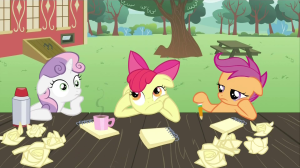If your saw last week’s post, you’ll know that I’ve been struggling a bit with my fiction lately. Part of this is focusing on a story that just wasn’t working, but it’s also because I’ve been doing a lot of non-fiction writing lately which works differently to fiction. I was out of practise. And that can cause a build-up of negative thoughts, which let’s face it, every writer gets at some point, to bubble to the surface. Those negative thoughts can be crippling, so what can you do about them?
On the bad days
- Take a break. This only works if you’ve been writing regularly. In which case, you might have a bit of burnout. Creativity needs room to breathe, so if you feel like every sentence is the worst thing you’ve ever written, it might be time for a break. Go for a walk, bake some cakes, have some lunch. Whatever it is, do something that makes you feel good and you’ll be able to return to those sentences with renewed energy. You never know, they might not be so bad once you’ve had a breather.
- Have more than one project on the go. If you’re always working on the same thing, you may become jaded about it. If the gremlins start whispering in your ear while you’re working on one project, it can have a bad effect on your writing. Instead of tapping away, try switching to a different project. Re-channel those creative juices to keep the positivity flowing. You can always go back and readdress the reason you were feeling negative when you’re ready.
- Write every day. And I mean every day, no matter how you feel. If you sit in front of that keyboard even when you’re feeling down and uninspired, you’ll train your brain to become creative every time you sit down to type. It doesn’t matter if what you write on those days is bad, that’s what editing is for. And it doesn’t matter how long you write for, as long as you give your brain enough time to get going.
Suffering from rejection
- Learn from your ‘mistakes’. If you think your writing is bad, or you’ve done something else that makes you cringe when you look at it or perhaps received a rejection, don’t dwell in a lagoon of misery feeling sorry for yourself. Learn from those mistakes. Work on making those sentences better, read your rejection for clues to improving your work. Make new plans and plots using what you’ve learned. Everyone makes mistakes. The only way to improve is to learn from them.
- Focus on previous positive feedback. Sometimes you just have one of those days when all the negativity becomes too much. The paranoia part of your brain is telling you you’re a bad writer, that you’ll never be published, and even worse, it has evidence to back it up. Shut that voice up by remembering positive feedback you’ve received about your writing. It might just be from your mum, but that’ll do. Or perhaps it’s from an editor who has published you, or a competition win. Or maybe a recent review of your book or something a friend has said in passing. If it helps, type it all up and stick it up near your writing desk.
- Remember that rejection isn’t personal. If you’re getting repeat rejections, you’re bound to feel down. Sometimes even the fact that you’re not a writer until you’ve been rejected doesn’t help. If you’re having one of those days, repeat after me; it’s not personal and writing is subjective.
The editor/agent/publisher is not rejecting you, they are simply saying that they, as an individual, don’t like your idea or your writing. That’s not to mean that others won’t. If you’re lucky, you’ll get a personal rejection which means you can alter your story or your approach if need be. But if you get a form rejection, it can be hard to know what to do. Ask yourself how you feel about your story/query/synopsis. If you’re heart’s in it and you’re in love with it, then keep plugging away. You’re bound to find someone else who loves it too.
Feeling more pumped up? Good! Now, go write your masterpiece, whatever it may be.
